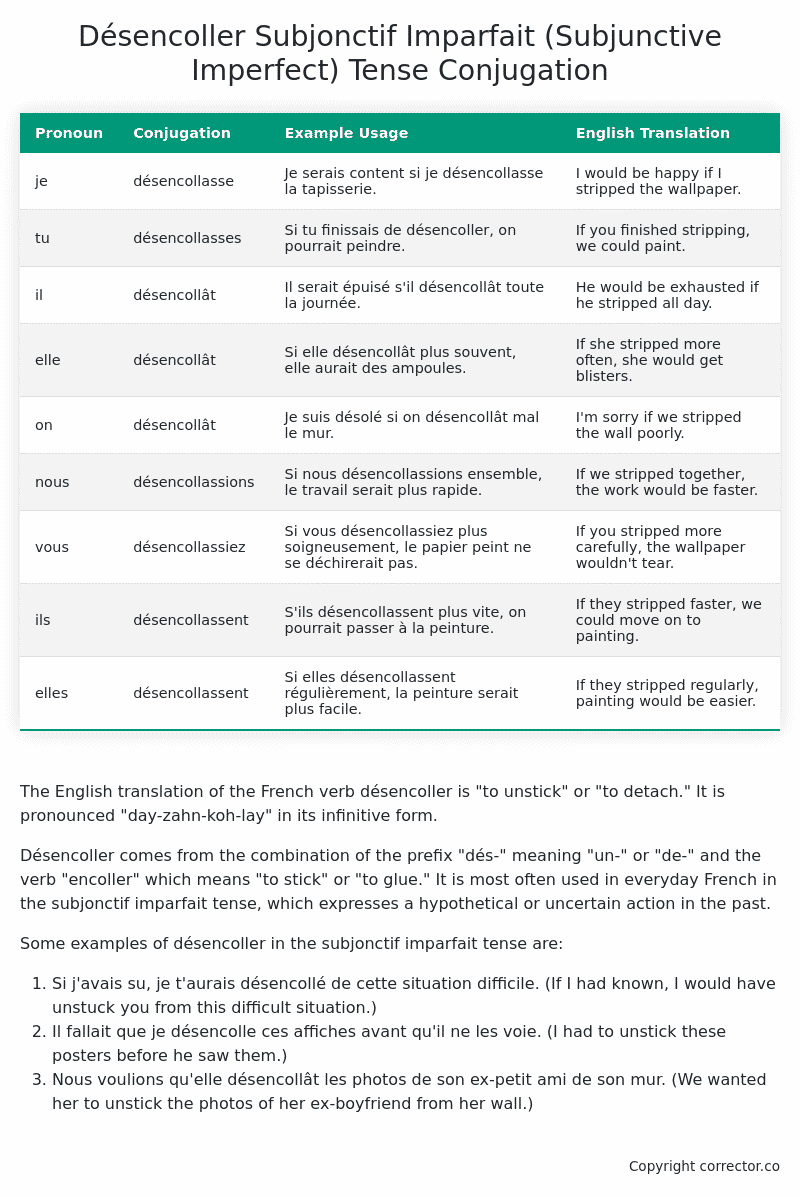Subjonctif Imparfait (Subjunctive Imperfect) Tense Conjugation of the French Verb désencoller
Introduction to the verb désencoller
The English translation of the French verb désencoller is “to unstick” or “to detach.” It is pronounced “day-zahn-koh-lay” in its infinitive form.
Désencoller comes from the combination of the prefix “dés-” meaning “un-” or “de-” and the verb “encoller” which means “to stick” or “to glue.” It is most often used in everyday French in the subjonctif imparfait tense, which expresses a hypothetical or uncertain action in the past.
Some examples of désencoller in the subjonctif imparfait tense are:
- Si j’avais su, je t’aurais désencollé de cette situation difficile. (If I had known, I would have unstuck you from this difficult situation.)
- Il fallait que je désencolle ces affiches avant qu’il ne les voie. (I had to unstick these posters before he saw them.)
- Nous voulions qu’elle désencollât les photos de son ex-petit ami de son mur. (We wanted her to unstick the photos of her ex-boyfriend from her wall.)
Table of the Subjonctif Imparfait (Subjunctive Imperfect) Tense Conjugation of désencoller
| Pronoun | Conjugation | Example Usage | English Translation |
|---|---|---|---|
| je | désencollasse | Je serais content si je désencollasse la tapisserie. | I would be happy if I stripped the wallpaper. |
| tu | désencollasses | Si tu finissais de désencoller, on pourrait peindre. | If you finished stripping, we could paint. |
| il | désencollât | Il serait épuisé s’il désencollât toute la journée. | He would be exhausted if he stripped all day. |
| elle | désencollât | Si elle désencollât plus souvent, elle aurait des ampoules. | If she stripped more often, she would get blisters. |
| on | désencollât | Je suis désolé si on désencollât mal le mur. | I’m sorry if we stripped the wall poorly. |
| nous | désencollassions | Si nous désencollassions ensemble, le travail serait plus rapide. | If we stripped together, the work would be faster. |
| vous | désencollassiez | Si vous désencollassiez plus soigneusement, le papier peint ne se déchirerait pas. | If you stripped more carefully, the wallpaper wouldn’t tear. |
| ils | désencollassent | S’ils désencollassent plus vite, on pourrait passer à la peinture. | If they stripped faster, we could move on to painting. |
| elles | désencollassent | Si elles désencollassent régulièrement, la peinture serait plus facile. | If they stripped regularly, painting would be easier. |
Other Conjugations for Désencoller.
Le Present (Present Tense) Conjugation of the French Verb désencoller
Imparfait (Imperfect) Tense Conjugation of the French Verb désencoller
Passé Simple (Simple Past) Tense Conjugation of the French Verb désencoller
Passé Composé (Present Perfect) Tense Conjugation of the French Verb désencoller
Futur Simple (Simple Future) Tense Conjugation of the French Verb désencoller
Futur Proche (Near Future) Tense Conjugation of the French Verb désencoller
Plus-que-parfait (Pluperfect) Tense Conjugation of the French Verb désencoller
Passé Antérieur (Past Anterior) Tense Conjugation of the French Verb désencoller
Futur Antérieur (Future Anterior) Tense Conjugation of the French Verb désencoller
Subjonctif Présent (Subjunctive Present) Tense Conjugation of the French Verb désencoller
Subjonctif Passé (Subjunctive Past) Tense Conjugation of the French Verb désencoller
Subjonctif Imparfait (Subjunctive Imperfect) Tense Conjugation of the French Verb désencoller (this article)
Conditionnel Présent (Conditional Present) Tense Conjugation of the French Verb désencoller
Conditionnel Passé (Conditional Past) Tense Conjugation of the French Verb désencoller
L’impératif Présent (Imperative Present) Tense Conjugation of the French Verb désencoller
L’infinitif Présent (Infinitive Present) Tense Conjugation of the French Verb désencoller
Struggling with French verbs or the language in general? Why not use our free French Grammar Checker – no registration required!
Get a FREE Download Study Sheet of this Conjugation 🔥
Simply right click the image below, click “save image” and get your free reference for the désencoller Subjonctif Imparfait tense conjugation!

Désencoller – About the French Subjonctif Imparfait (Subjunctive Imperfect) Tense
Formation
Common Everyday Usage Patterns
Interactions with Other Tenses
Subjonctif Présent
Indicatif Passé Composé
Conditional
Conditional Perfect
Summary
I hope you enjoyed this article on the verb désencoller. Still in a learning mood? Check out another TOTALLY random French verb conjugation!


